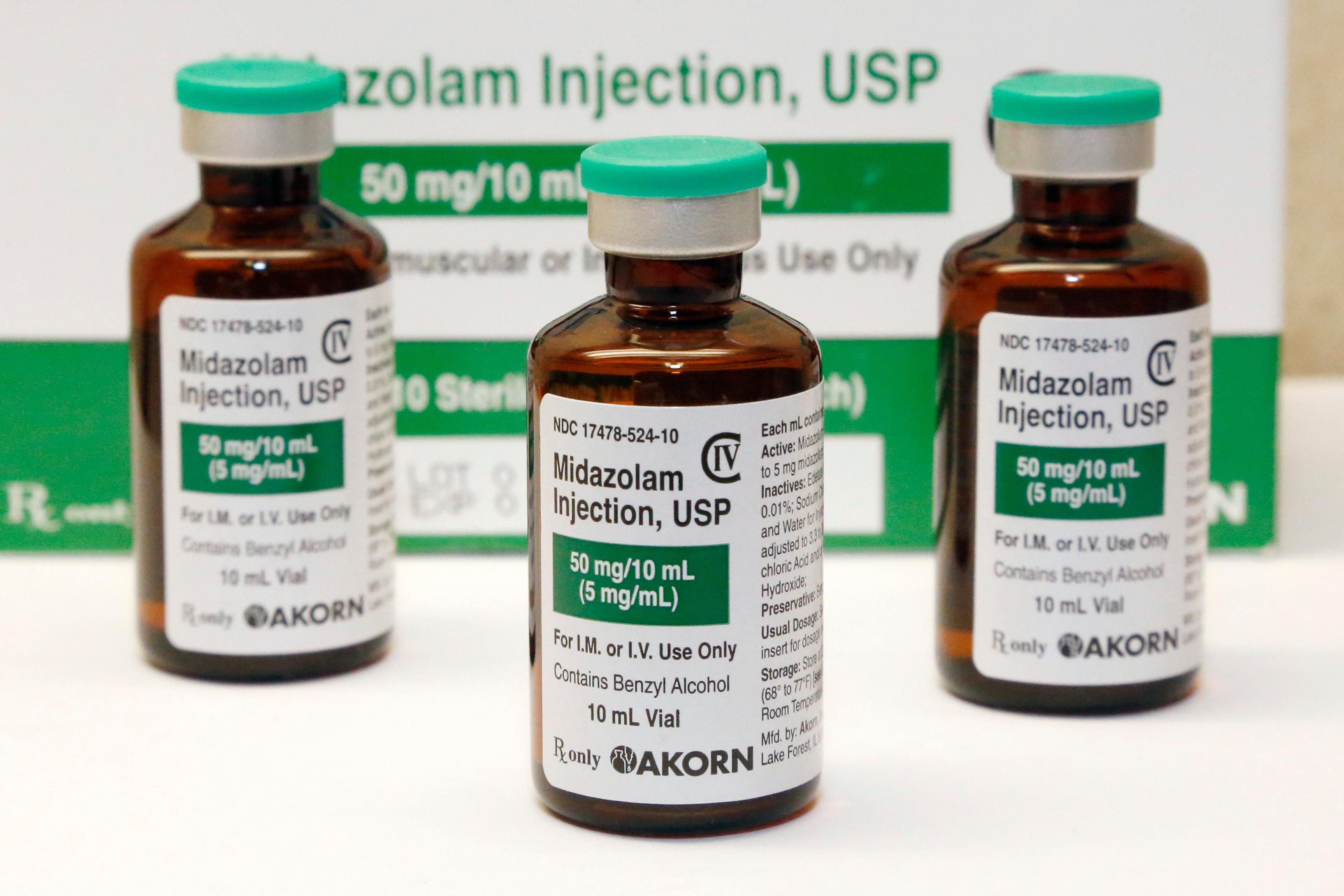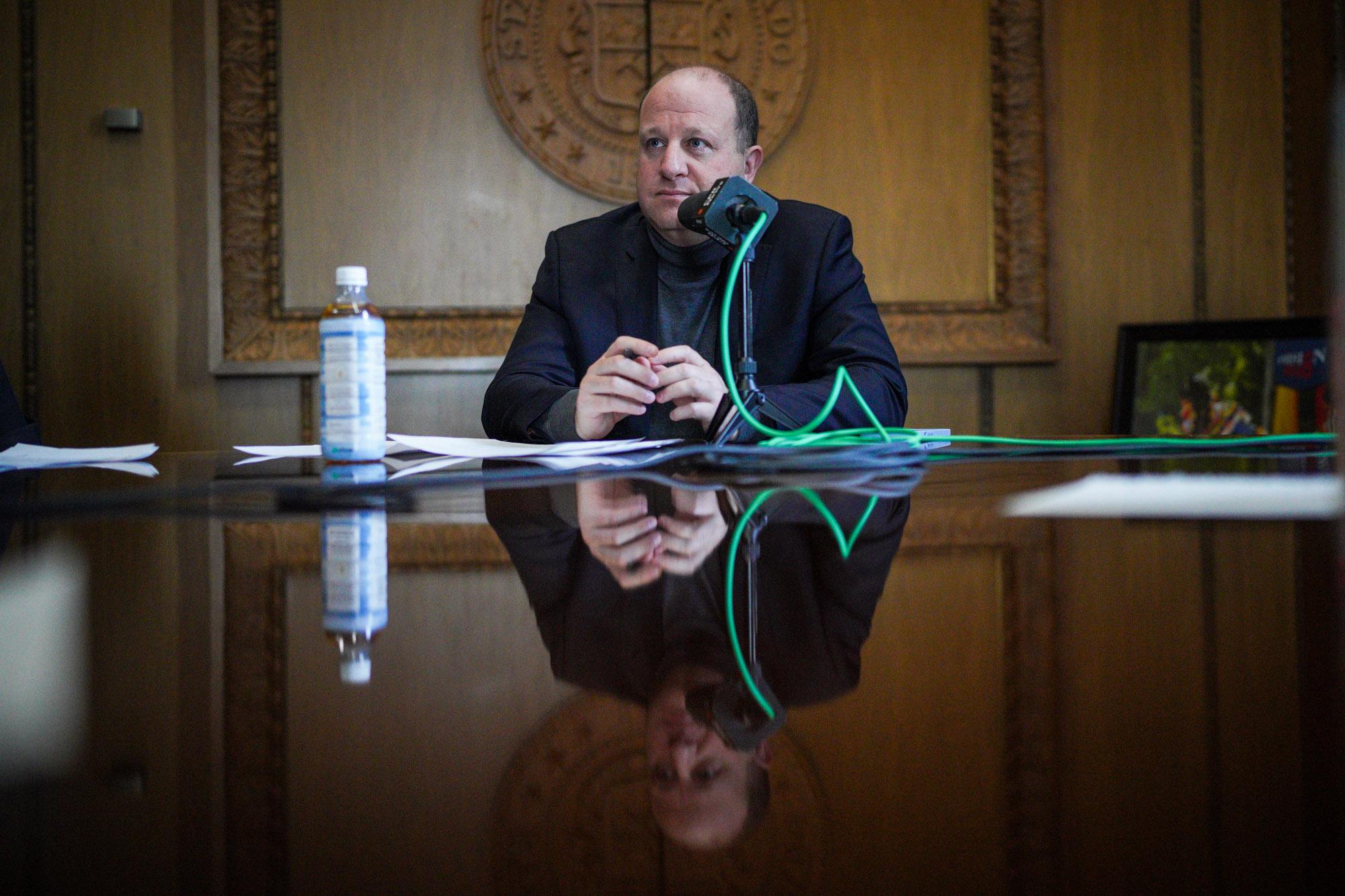
Gov. Jared Polis on Tuesday equated the drug fentanyl with poison and said he would support criminalizing possession of any amount of the substance.
Fentanyl use and deaths are skyrocketing in Colorado. Last year more than 700 people were killed by illegal use of the drug and fatalities are increasing faster than any state except Alaska. Last month, a bipartisan group of lawmakers introduced a bill to increase penalties for dealers while focusing on education and treatment for users.
After law enforcement officials complained the proposal didn’t go far enough, lawmakers are considering amendments that would make possession of more than one gram a felony.
“I'm certainly for felonizing any possession of fentanyl. It's deadly, it's killing people,” Polis said. “But I will sign any bill that moves in that direction.”
Even small amounts of fentanyl are more deadly — and can kill more quickly — than other illegal drugs like cocaine and methamphetamines, so the penalties should be tougher, he said.
Opponents of the tougher approach argue that treatment will be more effective than imprisonment for many users, but Polis compared the power of fentanyl to the deadly chemical anthrax, which circulated in the aftermath of the September 11 attacks.
And, Polis said, the threat of a felony conviction could persuade some users to lead police to their suppliers.
In his regular check-in with Colorado Matters, Polis said the EPA's recent decision to downgrade its classification of Front Range air quality is "good news" that will allow the state to increase its regulation of industrial polluters.
And, as COVID restrictions continue to wind down, he called on the federal government to move faster to release a vaccine for children under the age of 5.
This interview has been edited for clarity and length.
Ryan Warner: The Environmental Protection Agency last week downgraded the northern Front Range from a "serious" to "severe" violator of federal ozone standards. The agency’s move comes largely because of ozone. The state issued 65 health alerts last summer in this region, the worst year in more than a decade. Beyond what the EPA is likely to mandate — cleaner burning gas on the Front Range and tougher permitting for businesses — what steps is your administration taking to tackle smog?
Gov. Jared Polis: The EPA downgrade is good news. What it does for the state is it gives the Colorado Department of Public Health and Environment the ability to oversee about 300 more sites; about 200 of those are oil and gas, 100 are other emission sites.
Editor’s Note: According to the Colorado Air Pollution Control Division, the new classification will affect 473 emission sites to obtain permits, but nearly a quarter of those sites might be able to obtain exceptions, which may be how Polis arrived at 300 sites.
Warner: So, they will face stricter permitting.
Gov. Polis: They will have to do applications to reduce their emissions from about 300 additional sites. We are ready to work with them [the EPA] on the emission reductions that otherwise wouldn't have occurred without a downgrade.
Warner: I hear you saying that your administration is not going to oppose the EPA move. There's a public comment period right now.
Gov. Polis: Yeah, I wasn't aware of that. I thought we were already downgraded, but certainly we're excited to have the ability to reduce emissions with another 300 sites. But the big focus for us is a major clean air investment package that includes supporting e-bikes for low-income families, the transition of school buses to electric school buses, better air monitoring, and a lot of work around free bus passes and supporting [public] transit during the ozone season.
The focus of those efforts is the fact that the state is in very strong fiscal shape and we have the ability to make a major investment in improving air quality. That's what we're looking to do and hopefully we will be signing that in the next few weeks.
Warner: The notion that an EPA downgrade of our air quality is ‘good news’ strikes me as a strange way to frame it.
Gov. Polis: Well, it's been expected for years. The state did not have regulatory authority over [these 300 medium-emitting sites] before this downgrade. The state already had an interest in emission-reduction plans for large sites, but these are small-to-medium sites that, because of the downgrade, are now under the state purview. So we have the ability to work with the companies on emission-reduction plans now.
Warner: What are your thoughts on the cleaner-burning gas that would have to be sold on the Front Range? It's likely a more expensive fuel.
Gov. Polis: What we are focused on is supporting the transition to electric vehicles; about 13 percent of vehicles sold in our state last month [were electric]. We, through our bipartisan state infrastructure bill, set up the systems to develop not only additional charging infrastructure, but also support for people to get electric vehicles. We have now added electric vehicle charging stations at our state parks. Obviously more fuel efficiency is great, better fuel formulation is great, but the real answer is: don't burn any fuel. And the more cars that do that, the better our air will be.
Editor’s Note: The percentage of electric vehicles sold last month was 13 percent in Denver, but 11.5% statewide, according to the Colorado Energy Office.
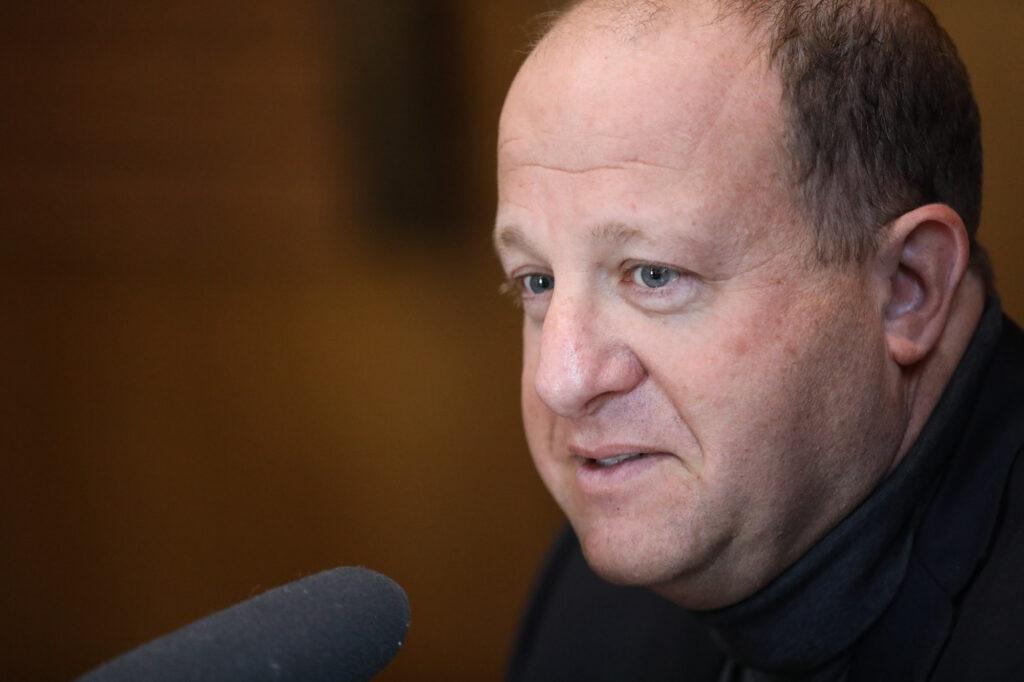
Warner: What do you say to people who hear that and think it's an elitist message coming from someone who is well-off?
Gov. Polis: Well, if you want to buy an electric car, buy an electric car. You certainly don't have to. It's a great choice because it saves people money: not only do you zero out your gas costs — and in fact, the equivalency in electricity is usually about a quarter as much, about 20 percent to 30 percent as much to operate — but you significantly reduce your maintenance costs over time.
People still have this misconception that electric vehicles are high-end Teslas when they come in almost every vehicle category. They're a great option for people who are low-and-middle-income to save money on their transport.
Editor’s Note: While the purchase cost of an electric vehicle is typically higher than a gas-powered vehicle, the total ownership cost is lower overall, according to a Consumer Reports study.
Warner: Much of your approach to all policy, but environmental policy in particular, is around the idea of incentives over mandates. Listener Andy Cushen of Denver asked,
“Why do Colorado Democrats keep limiting their green initiatives to incentives and bills rather than phasing them out by law, like making illegal gas-powered lawn mowers and other high-polluting ozone-contributing machines? Why do we enforce our way through an overdose crisis, which is going on right now, but only incentivize our way through the climate crisis?”
Governor, he is citing one particular example, a bill that would have banned gas-powered lawn equipment, but has since been watered down. You have gotten criticism from the environmental community over this broader question of incentives versus tougher regulation. Can you reflect on that balance in the face of what climate scientists call a ‘now or never moment?’
Gov. Polis: Certainly in Colorado, you're not going to have the police going door-to-door checking what lawnmower you're using. I think that concept is very contrary to our values, which are values of choice. It's a free market. People can make smart decisions to protect our air. And the truth is that the technology [in electric equipment] is simply better and less expensive. So unless you want to pay more and inhale fumes, you're going to go electric with a lot of your lawn equipment, if not now, then over the next few years.
Warner: If the free market worked, would the EPA be downgrading our air quality?
Gov. Polis: To be clear, we need the ability to reduce emissions where we can, and pollution is a negative externality, which means there's a government role in saying, ‘We need to make sure that you can't socialize your costs.’ You can't just say ‘We're passing our costs onto the people in the form of poorer health.’ And so we are trying to, in support of the free market, adjust for those economic externalities and say, ‘Nobody is allowed to socialize your costs. You have to be held accountable for the true cost of what you produce.’
Warner: You’re saying that the accountability then comes through their pocketbook?
Gov. Polis: Yeah, it can come through the pocketbook or outright policies around what type of equipment you should or shouldn't be able to use to reduce emissions.
Warner: And yet Democrats are not saying ‘you can't use gas powered lawn mowers’ at this point.
Gov. Polis: I don't think anybody wants the police to go door-to-door and arrest people for their lawnmower. That's just silly. Of course, no one is about to ban anything. Gas-powered cars will be a novelty in 30 or 40 years, but there will still be people driving them. ‘I have a 1982 Ford Mustang that runs on gas;’ There will be one out of a 100 cars that will probably run on gas in 30 years. There won't be very many filling stations. It'll be hard to find one. But if you look hard enough, I'm sure you will be able to fill up your antique vehicle.
Warner: That listener, Andy Cushen, mentioned overdoses a few moments ago. There's a big debate going on at the state Capitol around fentanyl. About 700 people died of fentanyl overdoses last year, and the deaths are increasing faster in Colorado than almost any other state.
Last month you were at a press conference to promote a bill that would have raised criminal penalties for dealers, while getting help to users. That approach mobilized a lot of law enforcement who argued that it will take tougher penalties to get this under control. It seems that Democrats are moving toward that point of view now as they negotiate the bill. Should penalties for possession of fentanyl be increased?
Gov. Polis: Absolutely. I called for that in my State of the State address that we need criminal penalties for possession of fentanyl. You have to look at each drug separately. I'm for legalization of marijuana because it's less harmful than alcohol, frankly, and it's absurd that it was ever illegal. Then you look at things like cocaine: You shouldn't use cocaine, but it's not likely to kill you when you use it. It kills some people, usually who have heart problems or with prolonged use. Fentanyl is extremely deadly and can kill people the first time they use it.
Of course, you need additional criminal penalties than you would for cocaine or for other drugs. You have to look at the science and data around each drug and come up with the appropriate way to have a public policy framework that promotes public safety.
Warner: The new proposal would make possession of more than a gram a felony. Does that feel right to you?
Gov. Polis: I'm for felonizing any possession of fentanyl. It's deadly, it's killing people. But I will sign any bill that moves in that direction. I'm glad that law enforcement will have more tools to prevent these hundreds and thousands of deaths from occurring in our state.
Now, to be clear, when you have criminal penalties, it doesn't make the problem go away. When marijuana was prohibited, it wasn't like no one used marijuana, but it did give [law enforcement] another tool to say, ‘How can we trace this back to the dealer, the source where the person will cooperate and help lead up the chain.’ You want to get the smugglers and you want to get the dealers. And sometimes that involves making sure that you can bring the user to the table around a cooperative arrangement where they reveal the sources of this deadly poison.
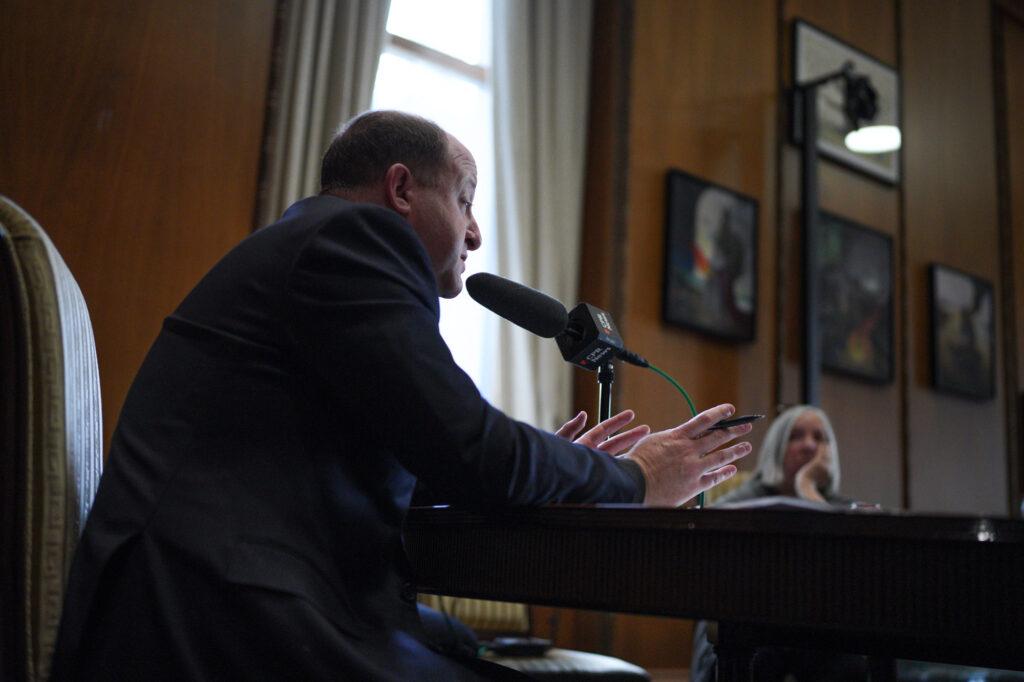
Warner: Any number of folks would say the War On Drugs didn't work the first time and a new war on fentanyl is going to have the same results. What do you think, Governor?
Gov. Polis: You have to think of fentanyl more as a poison than a drug. You remember when people were sending around the toxins in the Capitol, the white powder that was killing people, what was that?
Warner: Anthrax.
Gov. Polis: Anthrax, right. So you think of it more like anthrax. You don't say, ‘Okay, you have anthrax. We're going to send you to a place where we convince you not to have anthrax.’ You say, ‘Do you realize that one gram of fentanyl can kill over a thousand people?’ That's what we're talking about here. This is not cocaine. This is not even meth.
Editor’s Note: One gram of fentanyl can kill 300 to 500 people, according to the Associated Press.
Warner: You don't think it's similar to crack, for instance?
Gov. Polis: Absolutely not. Crack is an addictive drug. Fentanyl is a poison.
Warner: I want to talk briefly about COVID-19. You just sent a letter to President Biden urging him to speed up authorization of vaccines for children under five, which accounts for about 250,000 kids in Colorado. Specifically, what more do you want the FDA to do?
Gov. Polis: I hear from so many parents who say, ‘Why does my kid have to wait?’ It's bizarre. The safety has been demonstrated, and frankly, a reasonable level of efficacy has already been demonstrated for kids that are zero to 5 years old, so I don't know what's holding the FDA back from simply letting parents decide.
Warner: Will you keep wearing a mask when you fly, Governor?
Gov. Polis: I don't know, I might. I've been triple-vaccinated. I'm not too concerned about COVID, but it probably depends on what the level of transmission is at that time.
Warner: Let's talk about one of your policy priorities: free preschool for all kids. Lawmakers are expected to send that bill to you for your signature soon. Obviously, it will benefit the kids' families, but it will cost the state about $365 million through 2024. What's the benefit to taxpayers, overall?
Gov. Polis: Kids who have high-quality preschool enter school with better results over time, lower grade-repetition rates, higher graduation rates. It also saves parents over $4,300 a year and it's a workforce investment. For people to be able to work, they need affordable childcare.
We have a worker shortage now in many sectors, and nobody wants to work just to pay childcare. You want to make sure you get ahead by working, and making sure that your kid has a high-quality preschool is a linchpin of that. In addition, it benefits the kids, particularly low-income families, English language learners, and others that receive even more benefit from having their kids start early.
Editor’s Note: Experts say the education benefits Polis outlines are true but it’s difficult to estimate exact cost savings.
Warner: You mentioned the worker shortage. Isn't that going to be true of the teachers for Pre-K? Where are you going to find them?
Gov. Polis: We have another separate investment in the workforce around early childhood education, so absolutely that's part of our overall strategy. We're looking at where we can partner with some of our state sites, including at community colleges, to establish onsite daycare for both students and faculty. We also have an investment in educator workforce and early childhood workforce to make sure that we're ready to provide a quality educator for every kid who wants one.
Warner: Is it work that you think people want to do, especially ones who might be burnt out after the pandemic?
Gov. Polis: I think there are a lot of folks that really love to work in early childhood and historically it's been a very low-wage area. The question is, how do you professionalize it? When we're talking about quality preschool, it looks more like the benefits and salary of a teacher, a first-grade teacher or a second-grade teacher. That's moving from that $18-an-hour childcare worker, getting the training and skills they need, the upgrade they need for those who have the heart for the work and want the knowledge for the work, and then being able to have a professional vocation as an early childhood educator.
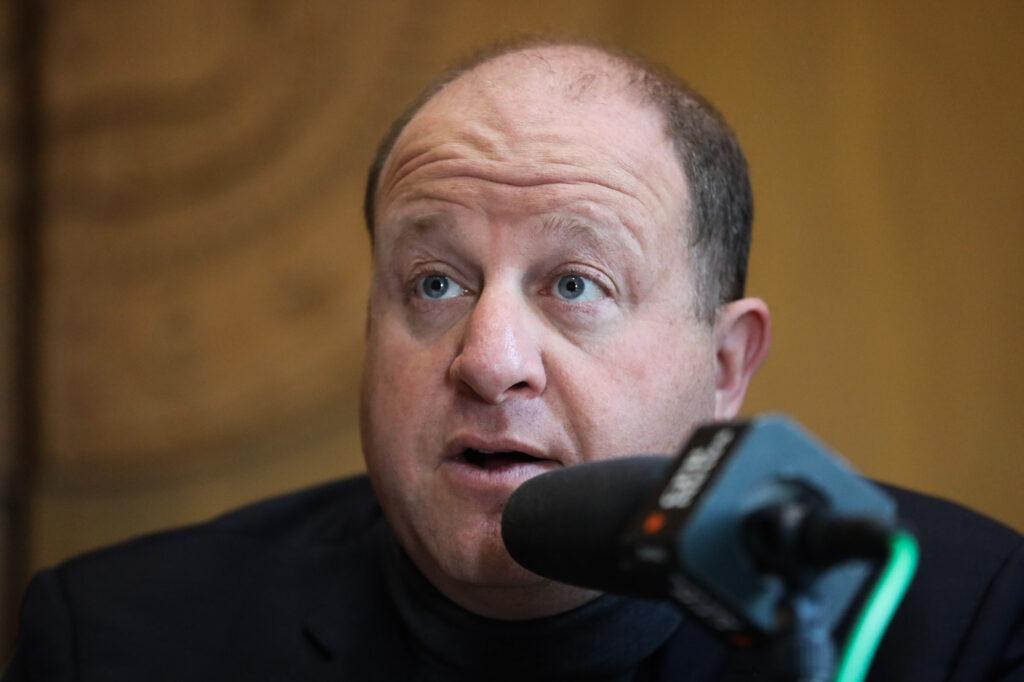
Warner: The biggest source of funding for this early childhood program is a tax on tobacco and nicotine products. There's a move in the legislature now to ban flavored tobacco. You have opposed that. Is it because you want to protect the revenue source for early childhood?
Gov. Polis: I support local control on a wide variety of issues and exactly what gets sold with marijuana or nicotine or alcohol is a local decision. I'm against statewide prohibition of alcohol or marijuana or tobacco, but if a community doesn't want to have a dispensary or doesn't want to have vape, that is completely their prerogative. I signed a bill that gave that explicit authority to local communities around vaping. They already have it with regards to tobacco and alcohol.
Warner: I think the ethical conundrum some might see is that flavored tobacco is seen as something of a gateway to young minds. And here you are paying to form those young minds with money generated by flavored products. Are you encouraging addiction by basing the revenue of state programs on these sorts of things?
Gov. Polis: Some of the revenue from the tobacco tax, the vape tax, also goes towards anti-tobacco programs and addiction-recovery programs. So it doesn't just go to early childhood [education], it goes to actually reducing tobacco usage.
Warner: Is there any ethical issue for you there, though, in that rat's nest of funding?
Gov. Polis: Certainly some of the tobacco tax, some of the alcohol tax and some of the gambling tax – I think it's completely appropriate that at least some of that tax goes towards education, addiction recovery and prevention.
Warner: You propose to save people money by delaying a two-cent-per-gallon fee on gasoline. It was supposed to start in July, now you're saying wait until January. You want cleaner air, but you're trying to keep the price of gas down.
The Biden administration, meanwhile, announced laxer rules on ethanol to drop the price at the pump. Are Democrats trying to have it both ways? Can you truly fight climate change, Governor, and do everything in your power to make gas cheap?
Gov. Polis: We must do both. We've got to make gas cheap because it's hitting families' budgets across the state. The price of gas is going to be based on international commodities, whether it's the war in Ukraine or other external events. If we have the power to save people two cents a gallon, does that help people? I have also suggested suspending the federal gas tax.
Does the difference of whether it's $3.90 or $4 mean people convert to electric vehicles? No. Suspending the tax is simply a way to provide relief to their pocketbook in the short-term.
Warner: What do you say to the environmental community that says that absolutely cannot be squared with someone who wants to fight existential climate change?
Gov. Polis: I think inflation's one of the biggest challenges the country faces. I want to make everything less expensive because inflation and the rising cost of living is the number one issue that Coloradans face. So it's not particular to gas.
Warner: I want to wrap up with something that comes from an interview in the Colorado Sun over the weekend with Colorado House Speaker Alec Garnett. He has said he's 99% sure he's quitting politics for good after this legislative session, citing a heightened tension in politics and a series of death threats he has received. He's 39 years old and had been widely viewed as a strong candidate for other offices.
Governor, you've been in elected office for quite a while, from the State Board of Education to Congress, and now the governor's office. How would you characterize the change you've seen?
Gov. Polis: I think what's frustrating to many of us in public policy is not that there are disagreements and opinions, but often there seems to be a lack of facts or a deliberate effort to avoid facts. It's hard to even have a discussion about where we should be on policy. I think that's the frustration that’s getting to many elected leaders.
Warner: When someone walks into your office and they're not citing the facts and you see that, what conversation do you have? Have you found a way to bridge that?
Gov. Polis: It just evolves the conversation to a recitation of the facts. Something like vaccine efficacy would be an example: Even with the high level of omicron we had in our state, we had much lower hospitalizations than we had in previous waves because most of the population had been vaccinated. And that's why we continue to have low hospitalizations today here in Colorado because of our high vaccination rate; I think we're at about 81 percent last time I checked.
I've always believed that [vaccination] is a personal decision, but to say it doesn't work is not factual. To say it somehow causes harm is not factual. To say that the risk of a side effect is even an order of magnitude close to the risk of the disease is simply false. So these are the falsehoods that we deal with every day. And I think you see that in a perhaps less life-or-death way on many other issues.
Editor’s Note: 81 percent of Coloradans have had at least one COVID shot, according to the CDPHE.
Warner: Are you looking forward to a fourth [COVID] shot?
Gov. Polis: I have not had a fourth shot yet. Certainly I think it's likely I might need to at some point and when that happens I won't hesitate, but as a relatively young, healthy person who's had three shots and also had COVID, it would be a reasonable choice for me to get one. But it's also reasonable for me not to get one.

